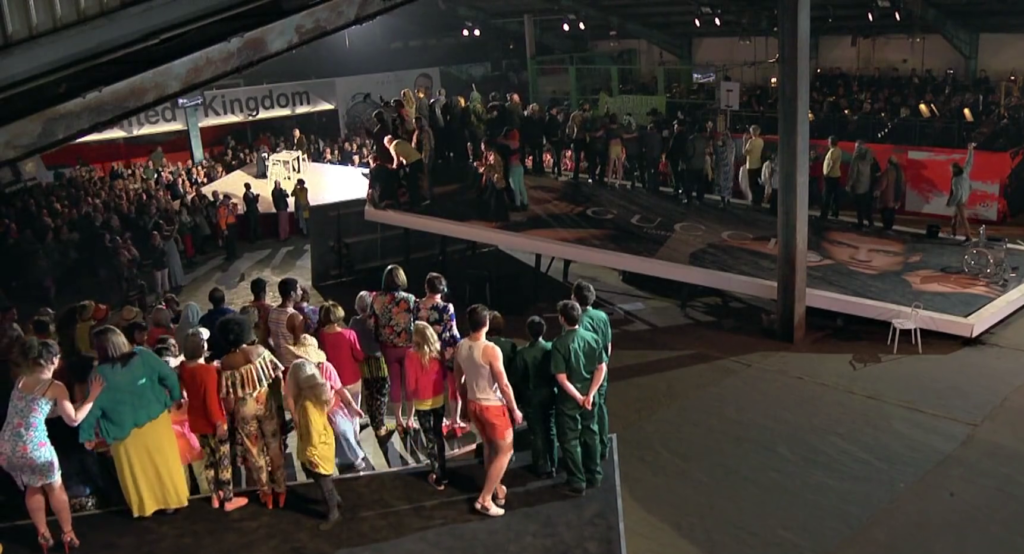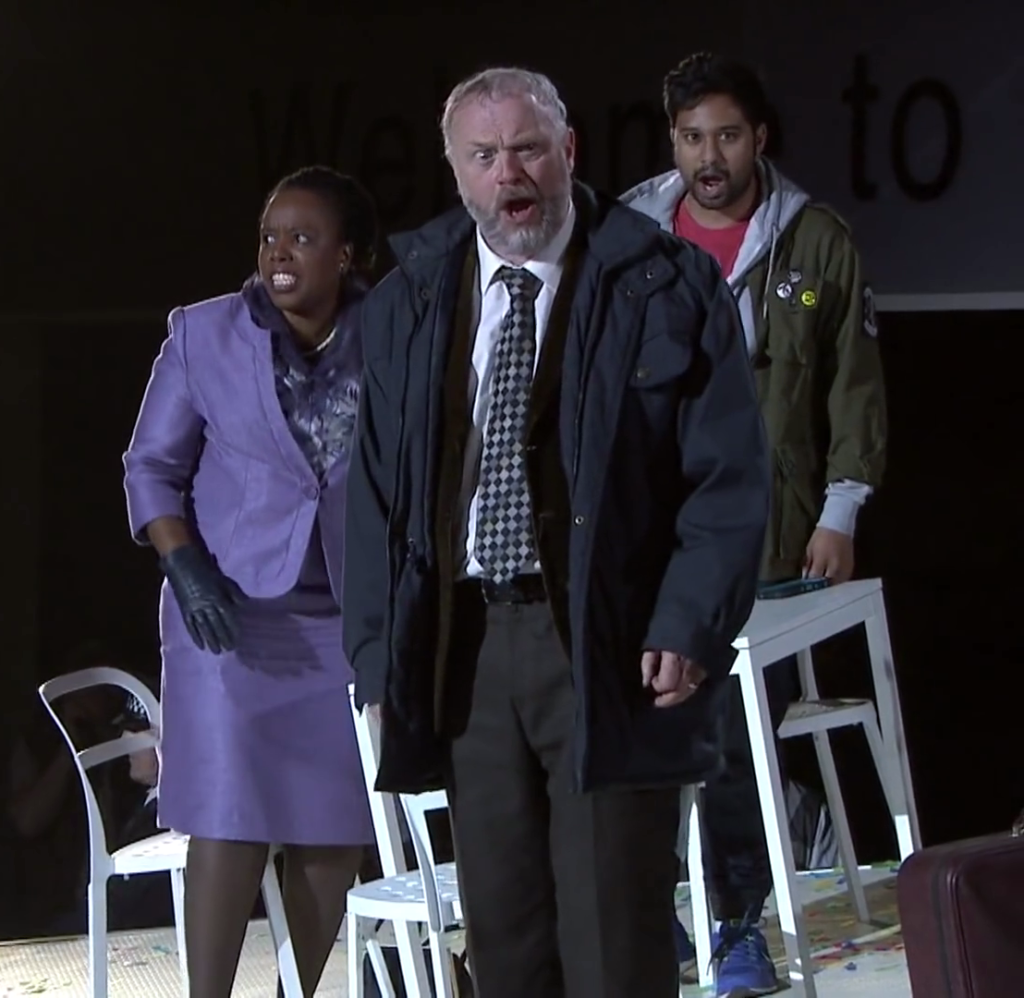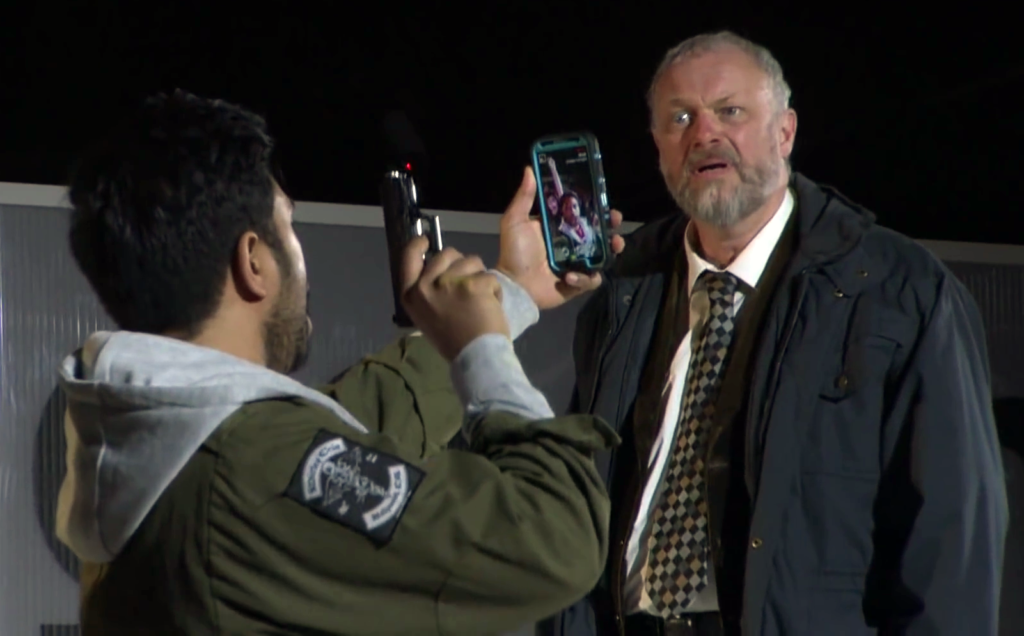When Michael Tippett composed The Ice Break, he was already in his early 70s. Set in a contemporary country (the US is strongly implied), and with characters caught up in racial violence and drug use, the opera received a tepid reception upon its 1977 Covent Garden premiere. The consensus was that the composer’s insistence on writing his own libretto, coupled with what Michael Berkeley calls “his touching but naive desire to keep in touch with the young and their vernacular”, had driven his dramaturgy into irreparably sophomoric sentimentality.
Thus, when director Graham Vick and conductor Andrew Gourlay focused Birmingham Opera Company’s attention on this fourth, and briefest, of Tippett’s five operas in 2015, it marked only the second time that the work had been staged in the UK. The production has now, for the first time, been made available to stream online through July 30, 2020. And just as Vick’s radical staging commemorated the anniversary of the Birmingham riots of 1985 and 2005, so does its video release place the opera’s themes of social fracture alongside the current milieu of BLM-driven protests.
Vick repurposed an abandoned Birmingham warehouse for the production, mocking up its interior as a stylized airport terminal (through which the ambulatory audience is ushered by uniformed “security” personnel), and setting the action rather specifically in the UK. The terminal is the locale for the first of Tippett’s three acts, but in this performance the opera unfolds in a continuous 75-minute span with no curtains or set changes. The story is compact: Nadia has come to meet her husband Lev, who is joining her in exile after spending 20 years in a (Soviet?) gulag for pacifism (mirroring Tippett’s own WW2 incarceration as a conscientious objector). Accompanying Nadia is their son Yuri, who does not remember his birth country or father, and who expresses contempt for the latter’s views on non-violence (“Cowards, they let themselves be stamped on”). Yuri has been radicalized as a young immigrant, and appears to have sympathies with white supremacists (“Here it’s different. We’re not pushed around. Every guy has a gun”).
Also arriving at the airport is Olympion, a victorious prizefighter and black militant. Greeting him is a crowd that includes Yuri’s WWC girlfriend Gayle and her black friend Hannah, a nurse who is also Olympion’s girlfriend. Gayle attempts to seduce the virile Olympion, incensing Yuri, who charges the boxer (“You motherfucking bastard!”). But Olympion easily repels him, then rebuffs Gayle as “trash”. Eventually the scene degenerates into a race riot in which Olympion and Gayle are killed and Yuri is badly injured.
Yuri is taken to a hospital, where Hannah tends to him and Nadia, who is dying from an unspecified illness. The chorus, augmented in this production by dozens of supernumeraries drawn from the Birmingham community, makes a second appearance as a mass of young, dancing, drug users beguiled by Astron, an extraterrestrial character (or perhaps a psychedelic apparition) voiced in unison by a male and a female singer. The communal trip dissipates, whereupon Hannah cuts a now-humbled Yuri out of his full body cast (in Vick’s staging, Yuri’s bloody clothing is scissored away, leaving him naked, both figuratively and literally). As Yuri struggles to walk towards his father (“Let me go, let me stand!”), the two men are reconciled (“Chastened, together, we try once more”).
Vick’s assembly of choristers and actors seems to include every available exemplar of modern street life and transnational conflict. Rioters, skinheads, cops, S&M practitioners and greedy industrialists are all in the mix, as are pushers, pimps, Islamist executioners and their orange-suited victims, and for the Astron sequence, 60s-style flower children. Brief excerpts of news reports and footage from the actual Birmingham riots are inserted during act breaks. It all lends a degree of novelty, immediacy and intensity to the drama. Yet the one-dimensionality of these personas echoes the shallowness of the main characters: 75 minutes is just not enough time for us to learn much about the principals (only half of which survive to the end), or their personalities and motivation. Nor is it enough time to dramatically prepare Nadia’s death and the bizarre Astron/acid digression. There’s also little that can be done about the daft lyrics, including appropriation of such period slogans as black is beautiful and burn, baby, burn. The real star here is the mise en scène itself, whose impact must have been especially memorable for the live audience, which apparently included a considerable number of first-time opera attendees.
Whatever dramatic limitations may persist through a staging of The Ice Break, there can be few regrets about its music, which typically of late Tippett is unpredictable, rhythmically potent, and confident in its exploitation of contrast and instrumental color. The orchestra includes organ, electric guitar, electric bass, drum set, and a team of eight percussionists. And the sound world parallels that of Tippett’s Third and Fourth Symphonies (also from the 1970s), with the sheer delight and prowess in the elicitation of timbral mixtures pointing ahead to his final masterpiece, The Rose Lake from 1993.
The opera opens with two striking chords which return at various points as a ritornello. Tippett regarded them as “the frightening but exhilarating sound of the ice breaking on the great northern rivers in the spring”, but they also symbolize the binary divisions that drive the opera’s dramatic conflict: divisions of race, of class, and of generations as evinced in the chords’ final recurrence, when the convalescent Yuri labors to stride toward his father (1:17:17 in the video). Indeed, the entire closing sequence seems modelled on the dialectic conclusion to the composer’s Third Symphony (1970–72), which alternates between despair and optimism, with the latter—barely—getting the last word.
Another highlight, and the opera’s one compelling soul-searching aria, is Hannah’s soliloquy (“Blue night of my soul”), tenderly accompanied by flute and harp (37:28). Meanwhile, Tippett’s flair for juxtaposition and polystylism is showcased in the demonstration scenes, which include a characteristic Protestant hymn sung to “the noblest of the klan”, and a violent outburst between opposing camps represented by Coplandesque hoedown strings on one side and ambiguously Afrobeat reeds and drums on the other (42:38). Stylistically, the operas of Turnage and Adès can be viewed as a continuation of Tippett’s lineage newly emerged from the darkness of chronic despondency. More specifically, the riot scenes and racy language in The Ice Break seem an important precedent for Turnage’s Greek (1986–88).
The acoustics in this unconventional performance space must have been horribly echoey, but the production team has managed to isolate the vocal and instrumental sources so well that the sound quality in the video exceeds that of the work’s only commercial recording (1991 with the London Sinfonietta and Chorus conducted by David Atherton). And the diction is surely more comprehensible in the video than it was for the live audience, who in this compact venue barely outnumber the cast.
Published right after the re-streaming of their 2012 premiere production of Stockhausen’s Mittwoch aus Licht, this revisitation of The Ice Break solidifies Birmingham Opera Company’s place among the world’s most innovative and accomplished proponents of music theater. Whether Tippett’s dramaturgy and uneven lyrics can be rehabilitated remains open to debate, but no one is better suited to the valiant effort than Vick and company.

Michael Tippett: The Ice Break (1975–6). Produced 2015 by Birmingham Opera Company. With Andrew Gourlay (conductor), Graham Vick (director), Stuart Nunn (designer), City of Birmingham Symphony Orchestra, Birmingham Opera Company Chorus and Actors. Lev: Andrew Slater, Nadia: Nadine Benjamin, Yuri: Ross Ramgobin, Gayle: Stephanie Corley, Hannah: Chrystal E. Williams, Olympion: Ta’u Pupu’a. Video produced 2020 by AdVision TV. OperaVision link



